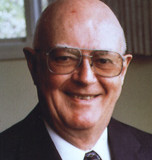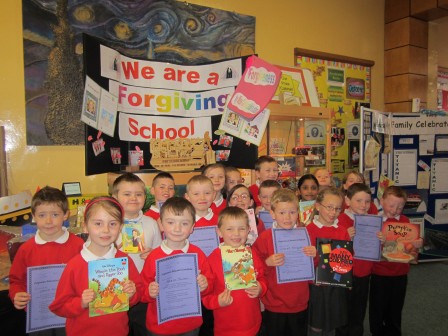Tagged: “Education”
Reflections for the 25th Anniversary of Our International Forgiveness Institute, Inc.
It was the early 1990’s and I just recently did an interview for a Chicago newspaper. The journalist published my home telephone number within the article. For the next two weeks, it seemed as if the phone just would not stop ringing. The people who called were seeking information about how to forgive. “There is a genuine hunger out there for people to know how to go about forgiving,” was my conclusion to family and colleagues.
about how to forgive. “There is a genuine hunger out there for people to know how to go about forgiving,” was my conclusion to family and colleagues.
Because we had published the first-ever empirical article on forgiveness in a peer-reviewed journal article only a few short years before this, in 1989, there was little out there instructing people on how to forgive those who have deeply hurt them. Because of the ground-breaking work of Msgr. John Hebl, with whom I had the honor of publishing the second-ever empirical article on forgiveness in a journal, in 1993, there was emerging scientific support for our Process Model of Forgiveness.

William Walker
About this same time, the late and great Dr. William Walker of Madison, who ran radio stations, wrote a letter to me (email was not big yet). He explained that many years ago, he received his doctoral degree from the Department of Educational Psychology at the University of Wisconsin-Madison, where I was (and am) a professor. Dr. Walker explained to me that he was drawn to our forgiveness work, had the financial means to bring this to an important level, and he had an interest in joining the research. I enthusiastically agreed and a strong collegial relationship and friendship developed.

Tom Walker
When my dear friend William passed away, his son Thomas Walker took up the cause and provided the necessary funding to keep the IFI viable and expanding, as he does to this day.
Thank you, William and Thomas!
Given that we were getting some financial support and the many requests for forgiveness information continued, some of my colleagues and I decided to try to form an entity with the goal of serving people who wanted information on how to forgive. This was to start as a service entity for all who were interested in forgiving.
Our little group decided to take the non-profit route and developed the 501(c)3 entity, the International Forgiveness Institute, Inc. (IFI) in Madison, Wisconsin in 1994. A Board of Directors was formed to help guide the development of this organization. Thank you, Board Members, for your dedicated service to our IFI! At the time of its formation there was nothing “international” about this organization. Yet, it was the vision, the promise of such expansion, that led to our keeping that word “International” in the title. We, of course, started small, without even a website.
International Forgiveness Institute, Inc. (IFI) in Madison, Wisconsin in 1994. A Board of Directors was formed to help guide the development of this organization. Thank you, Board Members, for your dedicated service to our IFI! At the time of its formation there was nothing “international” about this organization. Yet, it was the vision, the promise of such expansion, that led to our keeping that word “International” in the title. We, of course, started small, without even a website.
A major turn occurred for us at the beginning of the 21st century. Because our work was having success in the mental health field with our Process Model of Forgiveness, I had an idea: Why not start to introduce forgiveness to children and adolescents? After all, if they will experience injustices, perhaps even severe injustices in this world, why not equip them with the scientifically-supported approach of forgiveness to reduce the resentment, caused by the injustices, so that they can be resilient in their emotional well-being and in their healthy family interactions?
With the idea of prevention in mind, we decided to build forgiveness curricula for children, starting in first grade (age 6 and 7). We did so through age-appropriate children’s stories, such as Dr. Seuss’ Horton Hears a Who. The children, in their own classrooms, then begin to see what forgiveness is, how story characters navigate interpersonal conflict, and what happens when people forgive. We piloted this curriculum for the first time in Belfast, Northern Ireland, did the research on this endeavor through the university, and published the first empirical evaluations of this work in 2007.

Primary 3 students at Holy Family Primary School in Belfast celebrate their “Forgiveness Graduation.”
The results were dramatic! Children, upon hearing stories and reflecting on the theme of forgiving, actually reduced in their own anger. Teachers saw greater cooperation among students in classrooms and teachers reported to us that they, themselves as teachers, improved in their own teaching skills as a result of being a forgiveness instructor.
The Forgiveness Education project grew to such an extent that we now have a complete set of curriculum guides from pre-kindergarten (age 4) all the way up to the end of high school (age 18), including an anti-bullying guide and two guides for parents: A Family Guide (for those with primary-aged children) and Strengthening Families (for those with middle-school aged children). Dr. Jeanette Knutson, Amber Osmulski, and Dr. Matthew Hirshberg helped to craft these guides. Thank you, Jeanette, Amber, and Matthew!
 The Forgiveness Education curriculum guides have been ordered by educators from over 30 countries across the world. Other international endeavors include both the Jerusalem Conference on Forgiveness and the Rome Conference on Forgiveness and a new Forgiveness Education initiative in Bethlehem in the Middle East. Thank you, Mr. Thomas and Terri Lucke, for your generous funding! We now, I think, have earned the word “International” in our organization’s title.
The Forgiveness Education curriculum guides have been ordered by educators from over 30 countries across the world. Other international endeavors include both the Jerusalem Conference on Forgiveness and the Rome Conference on Forgiveness and a new Forgiveness Education initiative in Bethlehem in the Middle East. Thank you, Mr. Thomas and Terri Lucke, for your generous funding! We now, I think, have earned the word “International” in our organization’s title.
Our long-time Director at the IFI, Dennis Blang, has been instrumental in sending far and wide information about the Forgiveness Education guides, in maintaining our website, publishing the Forgiveness News, crafting the electronic newsletters, and overseeing the everyday important activities of our institute. Thank you, Dennis! And thank you to our earlier Directors, Dr. Gayle Reed and Mary Mead!
The service work has expanded so that we now are serving homeless people, those in prisons, and we have started a bumper-sticker campaign, “Drive for Others’ Lives” as a way to help make the roads a more civil environment. Many of these new ideas come from our stellar volunteer at the IFI, Jacqueline Song. Thank you, Jacqueline!
A big thank you goes out to our long-term President, Roy Lloyd, and to our Ethics Committee members for their dedicated work in examining our protocols that impact the homeless, those in prison, and others. Thank you to those “on the ground” who oversee important forgiveness programs in Belfast (Leah Judge), Greece (Dr. Peli Galiti), and Monrovia, Liberia (Rev. Kortu Brown and Mr. George Cooper). We want to thank all who have financially contributed to our efforts over this quarter-of-a-century.
 We started with one idea: Forgiveness is important as it can quell unhealthy anger and improve mental health and relationships. Many are catching on to this idea. In our humble opinion, forgiveness should now become a natural part of families, schools, organizations, and individual hearts for the good of humanity.
We started with one idea: Forgiveness is important as it can quell unhealthy anger and improve mental health and relationships. Many are catching on to this idea. In our humble opinion, forgiveness should now become a natural part of families, schools, organizations, and individual hearts for the good of humanity.
Long live forgiveness!
Robert
Should you wait for the offender’s apology before forgiving?
If you wait for the other to apologize, what does that do for your own freedom as a forgiver? You are trapped—trapped—in unforgiveness until the other apologizes. So, unconditional forgiveness (not needing an apology) sets you free to forgive whenever you are ready. We need forgiveness education so that children can begin to think about this important issue and other important issues that will aid their forgiving and aid them in growing as persons.
For additional information, see What is Forgiveness?
I have noticed that in both Hebrew and Christian scripture the central stories of person-to-person forgiveness focus on family issues only. Does this imply that we are to forgive only family members because of the love we share? Maybe it is too hard to forgive strangers.
While the story of Joseph forgiving his 10 half-brothers in the Hebrew scriptures and the story of the father forgiving his Prodigal Son in the Christian scriptures center on family issues, there are other passages showing the importance of forgiving people who are not family. Consider the parable of the unforgiving servant in Matthew chapter 18. In this story, the king forgives a servant who owes a large debt. That servant then refuses to forgive the debt of another servant, who is not a family member. The king is very unhappy about this lack of forgiveness. In the Lord’s Prayer or Our Father in Matthew chapter 6, people are exhorted to forgive and this is not centered on family members only. Thus, it appears that scripture does not focus on family only when teaching us about the importance of forgiving others.
For additional information, see the “Faith and Religion” page on this website.
Despite your response to a question on April 30 in this column, I can cite a variety of cases where the one extending mercy was indeed “higher” than the one receiving that mercy. Can you further explain your contention?
Yes, there are many examples of one person as “higher” than another in mercy, such as a judge reducing a deserved sentence of a person who is convicted of a crime. Yet, mercy in general is going beyond what is deserved to aid someone who is suffering. Such aid need not imply, in every case, that the one who is exercising mercy is somehow higher than the other.
Here is an example: Let us suppose that a judge just got into an auto accident. The judge is hurt and needs help. Now, here comes a driver, who is a convicted person on probation. The convicted person is late for work, under pressure, but nonetheless stops his car to aid the judge. This is costing the convicted person who now is going beyond fairness (after all, he could simply call 911 and move on) to help the judge, who is supposedly the “higher” person.
So, mercy is not always a moral virtue in which the “higher” person aids a lower person. If you think about it, by our use of the word “higher” in these examples, it always involves not some kind of spiritually higher situation, but instead only a social role situation. If we look beyond social roles, no one is higher than anyone else. Thus, mercy is the attempt to alleviate the suffering of another, regardless of social role.
Learn more at What is Forgiveness?
It seems to me that mercy and forgiveness are different. In mercy, one person is higher than another and has pity on the one who is hurting. In forgiveness, you level the moral playing field and each are equal in their humanity. Would you please clarify for me?
Actually, forgiveness is a moral virtue that flows from mercy and mercy flows from the moral virtue of love. Yes, you are correct that when a person is showing mercy toward another, the one who is merciful is helping someone in distress. This, however, does not at all make the one who extends mercy somehow higher in humanity than the one who is in pain. They are equal as **persons** even though their **circumstances** differ.
So, to summarize, love in the Greek sense of agape, is to serve others for the others’ sake. In the serving, one may have to endure pain and persevere and actually suffer in such serving. This, in other words, does not put the one who is serving in a higher position. Mercy is a particular form of love in which the one showing mercy tries to alleviate the pain of another, which can cause the mercy-worker to feel pain and experience humility in the serving, thus leveling the moral playing field in that this is one person helping another person. Forgiveness is a special case of mercy in that the forgiver tries to serve the offending person by alleviating his or her pain, misunderstanding, and even moral weakness by helping the one who caused pain and who may be in pain because of the unjust action. In each case of love, mercy, and forgiveness, the moral virtue is one **person** serving another **person or persons** and each is equal in their personhood.
For additional information, see Learning to Forgive Others.



